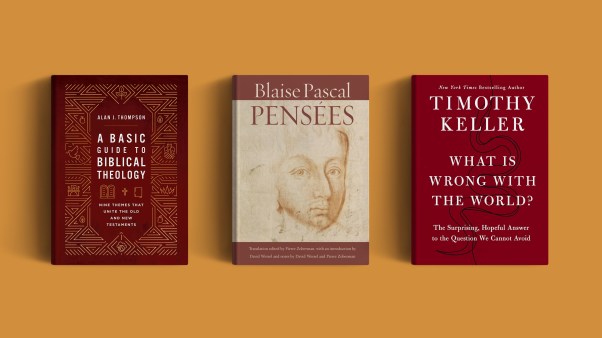As the closing line of his last work, Ecce Homo, which was edited into final form just weeks before his mental collapse, Friedrich Nietzsche asked the question: “Have I been understood?” Much of the last century of thought can be read as wrestling with that question, and now Stephen N. Williams, professor of systematic theology at Union Theological College in Belfast, Northern Ireland, picks up that discussion with The Shadow of the Antichrist: Nietzsche’s Critique of Christianity.
The Shadow of the Antichrist is an academic work, not a layman’s introduction to Nietzsche. The 725 footnotes in Williams’s text should make that abundantly clear. Nonetheless, there is benefit here for us all.
Williams’s aim is primarily descriptive—he wants to achieve a clear understanding of what it was about Christianity that agitated Nietzsche. To get at this, Williams ranges thematically across Nietzsche’s corpus, setting his overtly anti-Christian writings in the context of his interaction with figures such as Blaise Pascal, Laurence Sterne, Richard Wagner, and Arthur Schopenhauer. Williams also surveys twentieth-century thinkers from Dietrich Bonhoeffer to Jacques Derrida who, as Williams puts it, write in Nietzsche’s shadow.
What emerges from this thematic survey is a clear picture of Nietzsche’s essential charges against the church: Christianity is both anti-human and anti-creation, longing for redemption from this world and life. Thus, says Nietzsche, Christianity is fatal to genuine life, thriving in a soul-killing atmosphere of shame, guilt, and mediocrity. Nietzsche attacks Christianity not for being false but for being a dishonest way of life. He hopes that his readers will find Christianity not so much to be in error as to be in bad taste.
Thankfully, Williams does not limit himself to description, but he also debates Nietzsche’s assertions and weighs whether Nietzsche has found genuine areas of shortcoming in the church.
For instance, Williams argues that Nietzsche misunderstands the Christian doctrine of the goodness of creation (which should give rise to genuine love and enjoyment of this world, regardless of eschatology), but he also examines Nietzsche’s interactions with the church and finds the church to be weak in its practice of the doctrine. Theologically, we acknowledge the goodness of God’s created world, but in practice, we often act with just the kind of otherworldly disregard for the created order that Nietzsche condemns.
Likewise, as Williams walks us through Nietzsche’s portrayal of Christians as dogmatic, fearful herd animals to whom all passions seem bad and only safe tradition seems valuable, he calls us back to faithfulness where Nietzsche’s critique sticks. A brief survey of church history (or a brief look in the mirror) will suffice to lend credibility to at least some of Nietzsche’s assessment. Williams reminds us that Christian community, properly understood, requires the very kind of independence of thought, authenticity of existence, and truth that Nietzsche finds characteristic of the free spirits he admires. However, Williams also notes that such freedom is found only within the liberating boundaries formed by the love of God and others.
Williams does not linger long on these considerations, as his primary goal in this text is the unearthing of the roots of Nietzsche’s animosity toward Christianity. Unfortunately, Williams’s suggestions of how we might benefit from Nietzsche’s writings remain tantalizingly undeveloped.
Readers interested in an approach more critical of Christianity would be better served by Merold Westphal’s Suspicion and Faith: The Religious Uses of Modern Atheism. Westphal writes primarily to the church, not to the academy, and while he does provide a scholarly exegesis of Nietzsche’s anti-Christian critique (along with those offered by Marx and Freud), he frames that critique in such a way as to compel our self-examination as Christians. For those up to the academic challenge of Williams’s text, I would advise reading it alongside Westphal’s for a more complete picture of what is wrong, as well as what is right, in Nietzsche’s denouncement of our faith.
Williams shows us a shrill, embittered, and often mistaken Nietzsche. But he also helps us see a Nietzsche for whom honesty—truth embodied in action—is an absolute demand.
David Mills is Associate Professor of Philosophy and Director of the Honors Program at Cedarville University.
Copyright © 2007 Christianity Today. Click for reprint information.
Related Elsewhere:
The Shadow of the Antichrist: Nietzsche’s Critique of Christianity is available from Amazon.com and other retailers.
Stephen N. Williams wrote “On Religion and Revelation” and “How Nietzsche Found Jesus” for Books & Culture.
Other articles on Nietzsche include:
Darwin’s Graveyards | Yes, he really was a Social Darwinist. (Books & Culture, November/December 2006)
Neuroscience After Nietzsche | Is the brain a symphony orchestra without a conductor? (Books & Culture, November 1, 1999)
Nietzsche Was Right | The question is not why modern secularists oppose traditional morality; it is on what grounds they defend any morality. (Philip Yancey, Books & Culture, January 1, 1998)








